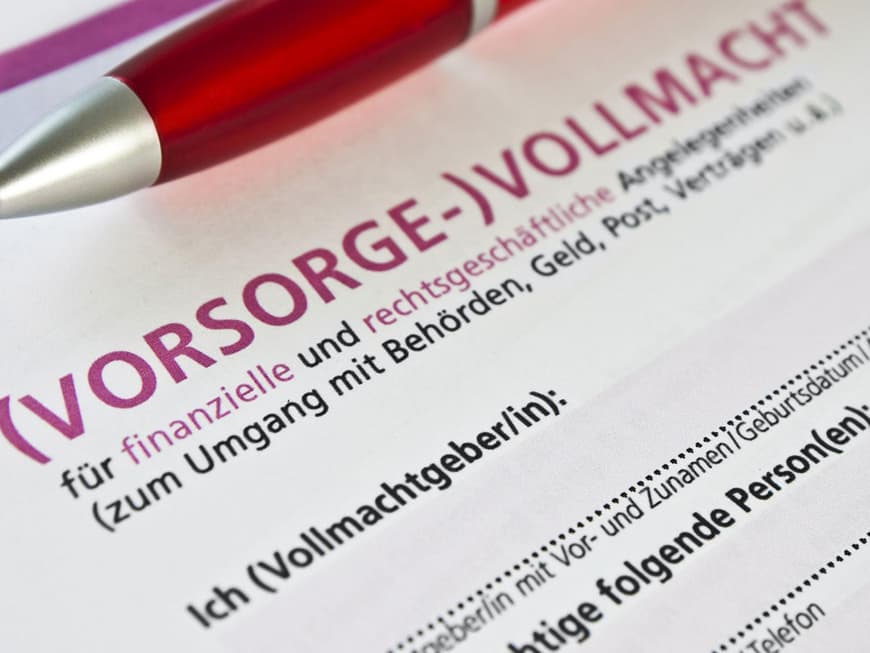Nobody likes to think about becoming seriously ill, having an accident or suffering a stroke. No, most of us prefer to push the thought of it far away. That's why very few Germans have a living will, a health care proxy or a custody order. The consequences can be dramatic: instead of a spouse, a complete stranger is appointed by the court as legal guardian. And if children lose their parents in an accident, they are not placed with relatives or godparents, but in a care home. A patient is kept artificially alive for years, even though he didn't want to be.
In an emergency, relatives are usually at a loss and have no idea what their loved one would want. Especially when a quick decision is required in an emergency, it is important that the wishes of the person concerned are clearly stated in writing. There are various directives that we can use to specify who should care for us in the event of an emergency, where we want to live, which medical treatments we want - and which we do not want under any circumstances. The documents should be checked regularly to make sure they are up to date, because if they are out of date, they will no longer be effective.
Keep documents easily accessible
Precaution is good, but the documents are useless if nobody knows where the originals are. This is because the authorized representative absolutely needs them and cannot act without them. It is therefore best to keep them together in an easily accessible folder. The directives should also be checked regularly - for example, with regard to the current address.
Advance care directive
After an accident or a stroke, any of us may find ourselves in a situation where we can no longer act. But important decisions still have to be made. For example, whether an operation should be performed or whether you would be better off in a nursing home. The advance care directive is a kind of safeguard in case you even need legal care one day because you yourself have become incapable of acting.
Precise instructions: It specifies in writing who should be the caregiver and who should not be under any circumstances. It is also determined where and how the person concerned wishes to live. Whether interventions such as the insertion of a feeding tube are desired or undesired. It can also be determined, for example, that the carer should send presents or money to relatives at Christmas. The carer then buys the gifts with the person's money. The wishes must be formulated as precisely as possible so that no mistakes are made. However, the guardian named here may only become active if he or she has been declared suitable by a court.
Quite informal: you can simply take a sheet of paper and write your wishes for a possible guardian on it. This can also be done on a PC. The Federal Ministry of Justice and Consumer Protection has published a form for this online at www.bmjv.de. In any case, the signature, place and date must be on the form. To confirm it, you can sign and date it again every two years. It must be an original, a copy is invalid.
Living will
Some people are afraid that not everything medically possible will be done for them when they are old or seriously ill. Others fear exactly the opposite: that doctors will make use of all technical possibilities in such situations and not let the patient die. To ensure that the patient's instructions can be carried out in an emergency, living wills have been available since 2009.
Incorrect wording: However, such a document is not valid in every case. Doctors may ignore the living will if, for example, it is not legally sound - for example, if it is incomplete or imprecise. The wording "I do not wish to live in undignified circumstances" may be useful as a guideline, but it is not binding. Because what is actually unworthy of life? Something different for everyone. It must therefore be formulated very precisely what the patient wants: artificial nutrition: yes or no? Ventilation: yes or no? Resuscitation attempts: yes or no?
Good forms: Forms and help with the wording can be found on the Internet: at the medical associations of the federal states, at www.bundesgesundheitsministerium.de or at the consumer advice center. The latter advises caution with sample forms from the Internet with predefined formulations. This is because everyone should draw up a living will according to their own personal wishes and ideas. The following also applies here: the form is unimportant, the date and signature are important. You are on the safe side if you give reasons for your wishes and if the family doctor also signs.
Decree on custody
The reality is: if there is no custody order, family courts will decide where underage children are best placed in the future. If only one parent dies, the other automatically receives sole custody, even if the two were not married, were separated or divorced. However, the prerequisite is that both parents have exercised joint custody. If the mother had sole custody, the biological father may be ignored. Incidentally, the children themselves only have a say from the age of 14.
Reasonable doubt: Although younger children are usually consulted before the court makes a decision, this is not a requirement. It is also not a matter of course that close relatives or godparents receive guardianship. Judges do not have to adhere to the order, but they usually follow it. They deviate from it if there are justified doubts about the suitability of the guardian - for example, if the grandmother is named but she is too frail to take good care of the child. If the judge does not consider a person to be suitable, he or she can appoint an association guardian or the youth welfare office as guardian and the child is then placed in a foster family or a home.
Formalities: The custody order must always be handwritten, contain the place and date and be signed by hand. It is helpful if the wishes are explained in detail - even if a person is not to become guardian under any circumstances.
Lasting power of attorney
Most people assume that they will automatically be represented by their spouse, adult children or next of kin if something happens to them and they become incapacitated. But this is wrong. Spouses or relatives can only take over medical and financial matters if they have been authorized to do so in advance by means of a power of attorney.
Guardianship court: This power of attorney should definitely be registered with the Federal Chamber of Notaries' register of guardians. This is because this is where the care courts first check whether there is a power of attorney. This can be done at www.vorsorgeregister.de and costs between ten and 20 euros.
Clear instructions: If this power of attorney does not exist, the state will intervene. The guardianship court then decides who should take care of the person's affairs. This can be a close relative such as a spouse - but a third party can also be appointed. The relatives then no longer have any influence on the decisions of the legal guardian. If they deem it necessary, they can even sell the person's house to pay for any care costs. However, this can only be done with court approval - relatives should therefore always ensure that court approval is obtained in such cases. The power of attorney can be written by hand or on a PC. Clear instructions, place, date and signature are important.
You may also be interested in this:
Women in the pension trap: make the right provisions now
Lasting power of attorney: What do I need to consider?
The best retirement provisions for women aged 40+
Making the right provisions: How to save for your pension
Pensions for women over 40: What is still worthwhile?
Plan well: The most important financial tips for women
Clever retirement provision: How to be prepared for old age


